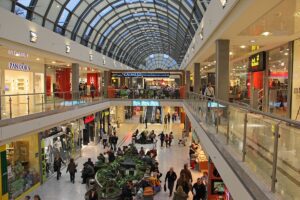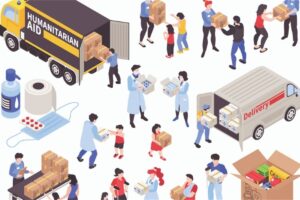
227 out of 320 shopping centers in Ukraine have resumed their work, the press service of the Ukrainian Council of Shopping Centers (USTC) told Interfax-Ukraine.
According to a study by the USTTS conducted in early June, in general, work has been resumed on 4.12 million square meters of leased space. m, which is 72% of all retail space, including shopping centers located in the temporarily occupied territory.
14% of retail space (804,000 sq. m.) remains idle, a significant part of which is damaged. At the same time, some damaged shopping centers have already partially or completely resumed work, for example, Lavina Mall (Kyiv), Retail Park (Kyiv region), Nikolsky (Kharkiv) and others.
According to the USTTS, the largest part of non-working shopping centers is recorded in the east of the country. Here, only 12% of retail space receives visitors, 42% do not work and 46% are located in the occupied territory.
Less than half of the retail space operates in the south (45%). In the capital, 11% of retail space in the shopping center remains closed. Almost all shopping centers operate in the north, west and center of Ukraine.
Established in 2020, the USTC is a non-profit organization that unites key participants in the retail real estate market: owners and developers of shopping centers, as well as companies involved in the construction and maintenance of shopping malls.
Ratio of the number of the unemployed in different regions of Ukraine in 2021 (thush people)

State employment center

Moldova is ready to continue providing humanitarian aid to Ukraine and to accept more refugees from Ukraine, Moldovan President Maia Sandu said.
“The Moldovan government has also provided humanitarian aid in Vinnytsia, Odesa, Chernivtsi and Mykolaiv regions to cover all the growing needs of the people who live there, and we are ready to continue to provide this assistance,” Sandu said at a press conference following talks with Ukrainian President Volodymyr Zelensky in Kyiv on Monday.
Sandu pointed out that about 500,000 people from Ukraine went to Moldova after Russia’s large-scale aggression. According to her, there are still 73,000 refugees from Ukraine in Moldova, 42,000 of whom are children.
“I confirmed our readiness to provide them with all the necessary support and accept more people if necessary,” Sandu assured.

The Kyivstar mobile operator since February 2022 has upgraded 3,000 base stations in small towns and villages with a population of up to 2,000 people by connecting LTE-900 technology to them, the company’s press service reported on Monday.
“Thanks to this, the network capacity has been increased and the quality of 4G has been improved in 3,500 settlements in 19 regions of Ukraine. Among them are Vinnytsia, Dnipropetrovsk, Zhytomyr, Zakarpattia, Ivano-Frankivsk, Kyiv, Lviv, Odesa, Poltava, Sumy and other regions of Ukraine where no active hostilities are taking place,” the statement said.
The operator notes that also in 2022, some 140 new base stations were built. And to improve the quality of communication in regions of intensive data traffic, the development of frequencies in the 2300 MHz range, received from the state for the period of wartime in the country, began.
According to Kyivstar, since the beginning of the war, almost 5 million of the company’s subscribers have moved from large cities to small towns within their region, and another 4 million have moved from other regions to the western regions of Ukraine. In this regard, the operator increases the network capacity and improves the quality of radio coverage in places where Internet traffic is growing.
“Since the outbreak of hostilities, the telecom operator’s specialists have eliminated thousands of emergencies that arose as a result of damage to the telecommunications infrastructure, replaced almost 30,000 meters of destroyed fiber-optic lines, carried out 3,500 repairs on cell towers. More than 90% of the telecom infrastructure is operating normally, providing communications and high-speed Internet for the needs of subscribers, the public sector and private companies,” the company said.

Das Financial Stability Board (FSB), dem insbesondere die Führung der Nationalbank und des Finanzministeriums der Ukraine angehören, schlägt vor, die bevorzugte Besteuerung von Kraftstoffen aufzugeben. Laut dem Pressedienst der NBU auf der Website vom Montag wird eine Erhöhung der Einfuhrsteuern, insbesondere der Verbrauchsteuern auf Kraftstoff, als eine der Möglichkeiten zur weiteren Steigerung der Haushaltseinnahmen vorgeschlagen.
„Nach den Ergebnissen von Januar bis Mai 2022 war das Staatshaushaltsdefizit größer als für das gesamte Jahr 2021 und 2020. Die Haushaltseinnahmen gingen zurück, auch aufgrund der Vorzugsbesteuerung von Importen, während gleichzeitig die Ausgaben vor allem erheblich anstiegen für militärische Zwecke und soziale Programme”, sagte die NBU in einer Erklärung.
Wie berichtet, einigte sich das FSB am 23. Juni auf zentrale Aktionsbereiche, um das Staatshaushaltsdefizit zu verringern und das Volumen seiner monetären Finanzierung zu reduzieren: Optimierung der Staatsausgaben und des Einnahmenwachstums, Aktivierung der Kreditaufnahme auf dem Inlandsmarkt und Erhöhung der Vorhersehbarkeit der internationalen Hilfe .
Ende März verabschiedete die Rada Änderungen der Abgabenordnung, wonach sie die Verbrauchssteuer auf die Lieferung von Benzin und Flüssiggas abschaffte und die Mehrwertsteuer auf die Einfuhr von Motorkraftstoff auf 7 % senkte.
Anschließend wurde der Rada ein Gesetzentwurf vorgelegt, der die Ablehnung dieser Leistungen vorsah, jedoch wurden diese Normen noch vor ihrer Einführung in die Halle davon ausgenommen, da sie eine noch stärkere Erhöhung der Kraftstoffpreise befürchten ließen. Infolgedessen werden ab dem 1. Juli die Einfuhrprivilegien für die meisten Waren gestrichen, für Kraftstoffe bleiben sie jedoch erhalten.
Die Nationalbank der Ukraine schlägt der Regierung und der Rada außerdem vor, einen zusätzlichen Einfuhrzoll von 10 % einzuführen, ähnlich dem von 2014-2015, um den Druck auf die Griwna zu verringern und den Staatshaushalt aufzufüllen. Die Regierung und der Profilausschuss haben sich jedoch bisher geweigert, eine solche Maßnahme anzuwenden.

The Financial Stability Board (FSB), which includes, in particular, the leadership of the National Bank and the Ministry of Finance of Ukraine, proposes to abandon the preferential taxation of motor fuel. According to the press service of the NBU on the website on Monday, an increase in taxes on imports, in particular excises on fuel, is proposed as one of the ways to further increase budget revenues.
“According to the results of January-May 2022, the state budget deficit was larger than for the whole year of 2021 and 2020. Budget revenues decreased, including due to preferential taxation of imports, while at the same time, spending increased significantly, primarily for military needs and social programs,” the NBU said in a statement.
As reported, on June 23, the FSB agreed on key areas of action to narrow the state budget deficit and reduce the volume of its monetary financing: optimization of government spending and revenue growth, activation of domestic market borrowing and increasing the predictability of international aid.
At the end of March, the Rada adopted amendments to the Tax Code, according to which it canceled the excise tax on the supply of gasoline and liquefied gas and reduced VAT on the import of motor fuel to 7%.
Subsequently, a draft law was submitted to the Rada that provided for the rejection of these benefits, but these norms were excluded from it even before they were introduced to the hall, as they caused fears of an even greater increase in the price of fuel. As a result, from July 1, import privileges for most goods will be canceled, but they will remain for motor fuel.
The National Bank of Ukraine is also proposing to the government and the Rada to introduce a 10% additional import duty, similar to the one that existed in 2014-2015, to ease pressure on the hryvnia and replenish the state budget. However, the government and the profile committee have so far refused to apply such a measure.